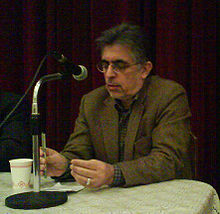Gholamhossein Karbastschi
Gholamhossein Karbastschi ( Persian غلامحسین کرباسچی Gholāmhossein Karbāstschi , DMG Ġolāmhossein Karbāsčī ; * 1954 ) was mayor of Tehran from 1989 to 1998 and is now general secretary of the Kārgozārān party. He is considered a politically reformist politician in Iran and is a close ally of former President Rafsanjani .
He was arrested, convicted and imprisoned in 1998 on allegations of corruption in what was viewed by the political support forces as a politically motivated attack by the Conservative government.
Life
Karbāstschi trained as a clergyman in the Shiite holy city of Qom and was temporarily imprisoned in Evin Prison before the Islamic Revolution in connection with his political activities .
Karbāstschi was a driving force in modernization efforts. From 1982 he served as governor of Isfahan Province . As the mayor of Tehran, he became known for tearing down apartment buildings and office buildings, largely without the city's approval, removing revolutionary graffiti from walls, planting thousands of trees and creating new large parks. In addition, he restricted private traffic in central Tehran.
Karbāstschi became unpopular with his politics with the bazaar traders through the collection of additional taxes and contributions, so that he had the reputation of having been "the most loved and hated man in Tehran" during his time as mayor. During his tenure as mayor, the first Iranian color printing newspaper, Hamshahri, was launched .
Political persecution
Karbāstschi was one of the most important supporters of the later President Mohammad Chātami in his first presidential campaign in 1997, which contributed to Chātamīs landslide victory. After Mohammad Chātami's victory, a power struggle between the reformers and conservatives began. In April 1998 Karbastchi was arrested. Thousands of students demonstrated against this arrest, which took place even though Karbāstschi was a member of the government cabinet and mayor of the Iranian capital Tehran at the time.
The legal persecution of Karbāstschi was seen by parts of the population as the most important part of a campaign by the Iranian clerical conservatives to curb the reformist administration of President Mohammad Chātami, the financial corruption was seen as merely a pretext. In July 1998, Karbastchi was sentenced to five years in prison for corruption and misuse of funds, despite the efforts of his supporters and a petition from more than 130 members of the European Parliament who wanted a pardon.
After his release from prison, Karbāstschi became general secretary of the Kārgozarān , in German the Party of Servants of Reconstruction . Karbāstschi is also the executive director of Hamshahri , a relatively new reformist newspaper in Tehran. This newspaper was banned several times for short periods of time.
In 2009 Karbāstschi supported Mehdi Karroubi in the Iranian presidential election .
In a February 2012 letter to religious leader Ali Khamene'i about the physical and psychological torture in Evin Prison, former political inmate Rohollah Zam describes how threats of renewed torture should trick him into making false accusations against Karbastschi Levy to enable the prosecuting authorities to arrest Karbastschi.
See also
Individual evidence
- ↑ Christopher de Bellaigue: In the rose garden of the martyrs. A portrait of Iran. From the English by Sigrid Langhaeuser, Verlag CH Beck, Munich 2006 (English original edition: London 2004), p. 61.
- ↑ Who is the mayor of Tehran? . In: BBC News , July 23, 1998
- ↑ The man cups us for green spaces . In: Berliner Zeitung , April 7, 1998
- ↑ The Mayor and the Mullahs; The Mouths That Roared in Iran . In: The New York Times , April 26, 1998
- ↑ The Case of the Tehran Mayor: Reform on Trial . In: The New York Times , July 1, 1998
- ↑ Torture In Evin - Letter To Khamenei By Former Political Prisoner Rohollah Zam persianbanoo, February 20, 2012 (translated into English) Original in Farsi
| personal data | |
|---|---|
| SURNAME | Karbastschi, Gholamhossein |
| ALTERNATIVE NAMES | غلامحسین کرباسچی; Karbaschi, Gholam-Hossein; Karbaschi, Gholam-Hussein |
| BRIEF DESCRIPTION | Iranian clergyman and politician |
| DATE OF BIRTH | 1954 |
